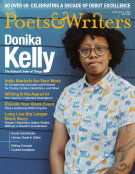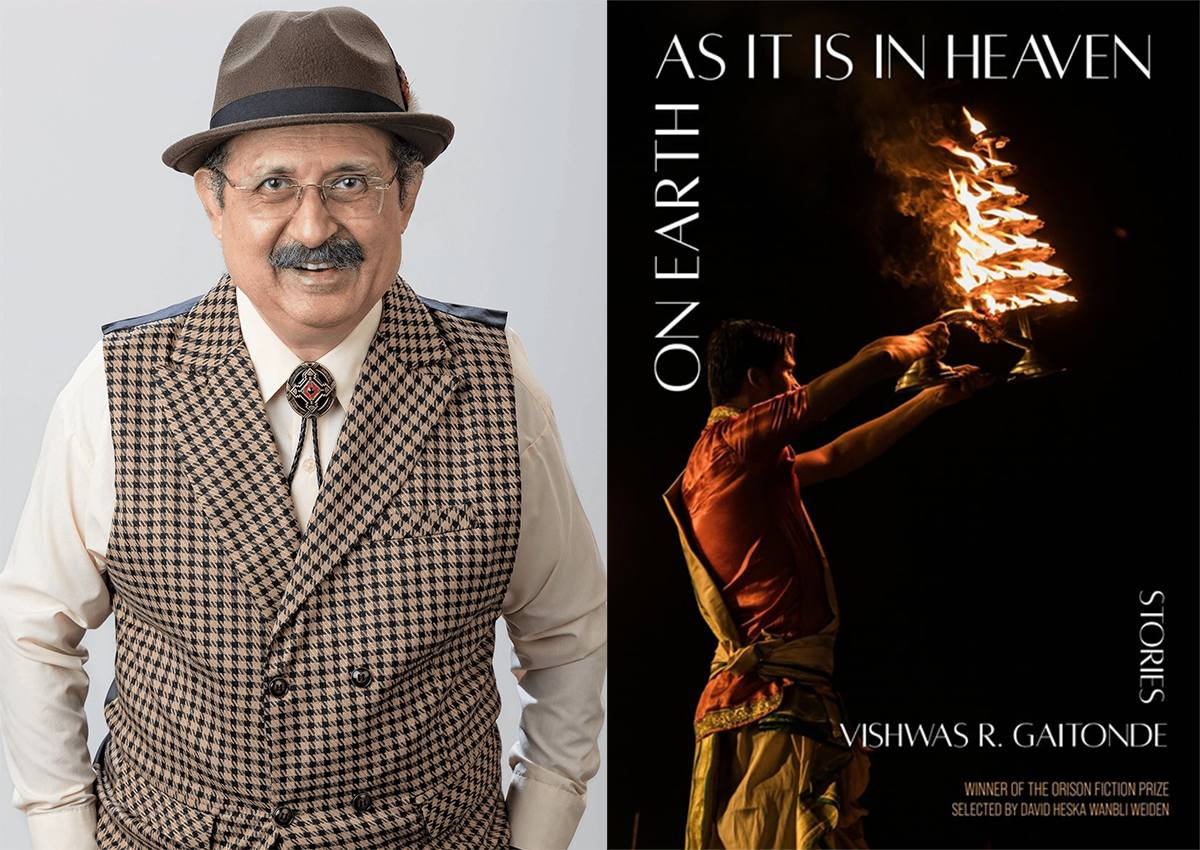Vishwas R. Gaitonde
Age: 68. Residence: Cary, North Carolina. Book: On Earth as It Is in Heaven (Orison Books, September 2025), a story collection alive with characters across continents and decades, as they negotiate new homes, cultures, and realities while searching for their own versions of paradise. Agent: None. Editor: Jonathan Geltner.
Writing flows through my veins and makes my arteries throb. My first work, a poem, was written at age six, after I watched through an open door as my bedridden grandfather received critical care in the adjoining room. Was my interest in both literature and medicine born at that moment?
Doctors can eventually become writers; it is much harder for writers to become doctors down the line. So I became a doctor, but then the writing bug bit me—and subsequently had me for lunch. During the course of my odyssey from India to America, with a stopover in Britain, I switched from medicine to medical writing. My day jobs were mentally draining, and a drained brain struggles to create. Still, I worked on a novel and submitted short stories to magazines. As writers who submit know all too well, it takes a slew of rejections before a piece is accepted. But each acceptance taught me that perseverance is the key to publication.
Whenever things are going well, life has the rotten habit of interfering. My father’s unexpected passing dumped a multitude of knotty problems onto my lap. At least a dozen years of my writing life were lopped off. But you play the hand you’re dealt. I kept writing as best I could.
Like most authors I’m an avid reader; I drew inspiration from older characters in literature. Miss Marple, from Agatha Christie’s works of fiction, solved the most complex crimes in her ripe old age, outsmarting policemen and outwitting criminals much younger than she was. In Rachel Joyce’s debut novel, The Unlikely Pilgrimage of Harold Fry (Random House, 2012), retired gentleman Harold Fry walks six hundred miles across England to see his dying friend Queenie Hennessy, challenging his senior years through sheer physical audacity and emotional resilience.
Also inspiring were authors who published their first books after age fifty, among them: Annie Proulx, Richard Adams, Raymond Chandler, Anna Sewell, and Penelope Fitzgerald. And those debuting after sixty: Laura Ingalls Wilder, Karl Marlantes, Frank McCourt, and Harriet Doerr. Harland “Colonel” Sanders and Grandma Moses published their autobiographies at ages eighty-four and ninety-two, respectively. If your little heart wanted something badly enough, you had to relentlessly focus on it, no matter how often you were waylaid.
When my novel was ready, I sounded out agents with regularity. It did not lead to any offers. I had enough short stories for more than one collection, but conventional wisdom decreed that agents weren’t interested in collections because they didn’t sell the way novels did, so I turned to contests.
I assembled a story collection, On Earth as It Is in Heaven. My manuscript didn’t win any contests at first, but it was a finalist in some, including the Iowa Short Fiction Award and the Mary McCarthy Prize in Short Fiction. The collection obviously resonated with varied groups of readers. It was a matter of tenacity and time.
Sure enough, it won the 2023 Orison Fiction Prize, which included publication. In his endorsement, contest judge David Heska Wanbli Weiden wrote: “It is indeed a pleasure to welcome this fantastic new voice in world literature.” Reading those words melted away a great many frustrations that had accumulated over the years.
I’m now directing my replenished zeal to my works-in-progress. And while others watch the setting sun and call it a day, I dance with joy to the music of the night.
An excerpt from On Earth as It Is in Heaven
Kismet
Every Saturday the neighboring town, which was bigger than theirs, held a suq, an open-air market. At the suq, after their group had dispersed among the stalls selling clothing and handicrafts and food, among the storytellers, musicians, fortune tellers, acrobats, and scribes offering letter-writing services, Omar sidled beside Yasmine. She was examining an array of trinkets and knickknacks.
“Which do you like the best? I’ll buy it for you.”
Yasmine glanced up at him and dropped her eyes to the wares again. “I’m just looking. I really don’t want any of them.”
“But they’re so pretty. Why merely look when one is within your reach?”
She said nothing, but he followed her eyes to a little copper bracelet set with pale-blue stones. The seller, a shrewd man who missed little, quoted an outrageously high price. Omar’s face crumbled, and Yasmine hid her smile in the folds of her blouse as he haggled with the man before finally forking out a sum higher than what other customers would have paid. Yasmine accepted the gift with a bashful look but did not wear it. They wandered around the suq, deliberately bumping each other and laughing. Then they joined the others on the slow trek home.
A couple of weeks later the bracelet appeared on Yasmine’s hand, and Omar no longer hovered under the awnings of shops on her errand routes. They walked together to school, taking the detour along the railway tracks, making sure the other students could be trusted or intimidated not to carry tales to either teachers or parents. They met in the evenings on a narrow, crooked lane that twisted itself off the main street. Many of the streetlights were burned out, and the darkness winked at them as it gifted them its veil.
“It’s still chancy out here,” Yasmine said. “Somebody can step out of their home.”
“Most residents on this street are elderly. They’ll be getting in bed or already snoring by now.”
“With our luck, some old man who’s unable to sleep will wander out here.”
“This is still the safest place to meet. Unless”—and his voice became low as his excitement grew—“we met outside of town.”
“What do you mean?” Yasmine blinked. “Risky. Risky.”
“We should cut through the fields south of the town a little earlier in the evening.” Omar’s eyes bubbled with mischief. “Till we reach those nice clumps of trees.”
“We’ll die a thousand deaths if we’re caught.”
“But we won’t be caught. Tell your parents you’re running an errand, and get a friend to do the chore for you. Your brain, my brain, between the two, my little Yasmine, we can always cleverly plan out each visit.”
In the shady groves, they embraced and fondled and kissed each other passionately, their bodies pliant, vibrant, alive. Omar, panting and groping, wanted to run the whole mile. Yasmine, while enjoying Omar’s caresses, was ambivalent.
“I’ll just keep my underpants on.” She was breathing heavily. “Others have done that and still enjoyed it.”
Omar laughed long and hard, the laughter ending with a grunt. “To paint a house properly, shouldn’t you paint the inside as well the outside?”
Excerpted from On Earth as It Is in Heaven, copyright 2025 by Vishwas R. Gaitonde. Used by permission of Orison Books, Inc. All rights reserved. www.orisonbooks.com
Author photo: Robert Filcsik via Headshots & Corporate Photography








